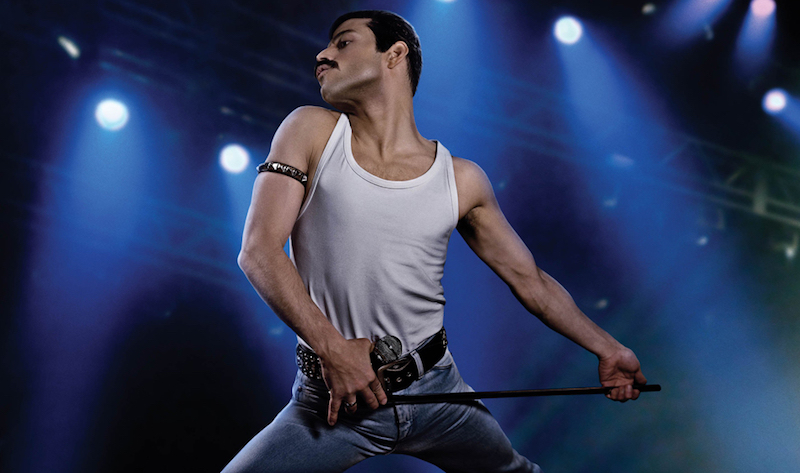‘Bohemian Rhapsody’ Rocks but Can’t Capture Mercury
Ready, Freddie? The new biopic zooms in on Queen's lead singer, playing more like an extended music video than a faithful biopic---but it's still electric. All hail the Queen: Rami Malek stars as Freddie Mercury in "Bohemian Rhapsody." (Twentieth Century Fox)
All hail the Queen: Rami Malek stars as Freddie Mercury in "Bohemian Rhapsody." (Twentieth Century Fox)
Focused primarily on lead singer Freddie Mercury, “Bohemian Rhapsody” is a pop opera about Queen, the British rock quartet. While the film more closely conforms to the MTV “Behind the Music” formula of sex, drugs and arena rock than the historical record, the result is an avalanche of wildly uneven storytelling and ridiculously entertaining performances in a PG-13 version of an X-rated life.
Meaning that it intermittently captures the opening lines of the song that gives it its title: “Is this the real life?/ Is this just fantasy?/ Caught in a landslide/ No escape from reality.”
Meaning that as a Mercury biopic it might be questionable, but as an extended-play music video of Queen’s music it’s irresistible—and I was never an aficionado. Nearly 50 years after Queen surfaced with its unique mix of synthesizer, click-track and polysyllabic lyrics (name-checking Galileo, Scaramouche and Figaro, among others), its music sounds even more danceable than it once did.
Rami Malek, the Egyptian-American actor best known for the TV series “Mr. Robot,” plays Mercury, born Farrokh Bulsara in what is now Tanzania and raised mostly in the U.K. Although Malek is, well, mercurial in at least two senses of the word, he wears prosthetic teeth to lend him the musician’s pouty overbite and early on it’s a significant distraction. Malek keeps sucking in his cheeks as if to keep the bridge in place. Happily, as Farrokh becomes Freddie, Malek grows increasingly comfortable and forceful in the role.
While Bryan Singer (“The Usual Suspects,” “X Men”) is the film’s credited director, he was booted and replaced by Dexter Fletcher. Whether it is because Singer was replaced or because two of Queen’s surviving members (creative consultants Brian May and Roger Taylor) wanted this to be the Queen story, not solely that of Freddie (who died in 1991), the film feels as though it is the product of a committee of sensibilities rather than one unified vision.
In this movie bookended by Queen’s 1985 appearance at the Live Aid concert, credit Malek for his ability to incarnate the pansexual—or is it omnisexual?—singer to give the film a center. In the establishing scenes Freddie simultaneously flirts with Mary Austin (Lucy Boynton), a stylish young woman, while cruising a passing lad. Freddie, this androgynous diva in a unitard, wants it all, sexually and musically. As unclassifiable as Freddie’s affectional preference is Queen’s music, ranging the spectrum from anthem to aria, often in the same song.
The film has it that Freddie loved Mary emotionally and men carnally, that only belatedly—after a diagnosis that he was HIV-positive—did he come to terms with his sexual preference.
Accurate? I have no idea. I wasn’t there. But I did flinch during a sex-and-drugs montage that seems to take place in 1980 and felt positively ahistorical. The camera follows Freddie from behind slowly walking down a corridor, like a convict toward the gas chamber, into the strobe lights of a gay bar blasting the Queen hit “Another One Bites the Dust.” As if somehow Freddie knew—even before scientists had established a connection between unprotected sex and the transmission of HIV—that the pleasure he was seeking there would kill him.
It is perhaps best not to think too hard about the story in “Bohemian Rhapsody.” It is perhaps enough just to enjoy Malek and the music.
Your support matters…
Independent journalism is under threat and overshadowed by heavily funded mainstream media.
You can help level the playing field. Become a member.
Your tax-deductible contribution keeps us digging beneath the headlines to give you thought-provoking, investigative reporting and analysis that unearths what's really happening- without compromise.
Give today to support our courageous, independent journalists.





You need to be a supporter to comment.
There are currently no responses to this article.
Be the first to respond.